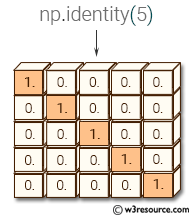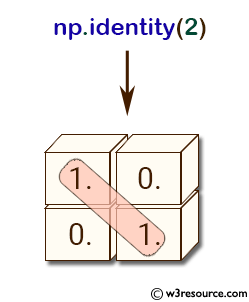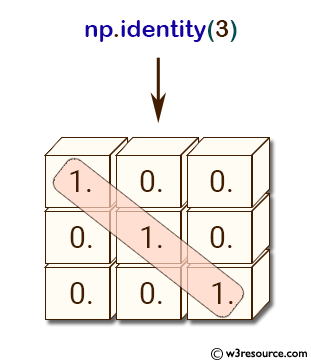NumPy: numpy.identity() function
numpy.identity() function
An identity matrix is a square matrix in which all the elements of the main diagonal are equal to 1 and all other elements are equal to 0. The identity() function return the identity array.
This function is useful in linear algebra, where the identity matrix plays an important role in representing the identity transformation in vector spaces. Identity matrices are also useful in testing matrix operations and algorithms, as they have special properties that make them easy to work with.
Syntax:
numpy.identity(n, dtype=None)

Parameters:
| Name | Description | Required / Optional |
|---|---|---|
| n | Number of rows (and columns) in n x n output. | Required |
| dtype | Data-type of the output. Defaults to float. | optional |
Return value:
[ndarray] n x n array with its main diagonal set to one, and all other elements 0.
Example-1: Create an Identity Matrix using NumPy's identity()
>>> import numpy as np
>>> np.identity(2)
array([[ 1., 0.],
[ 0., 1.]])
In the above example, numpy.identity(2) returns a 2x2 identity matrix with 1s in diagonal and 0s in all other positions.
Pictorial Presentation:

Example-2: Create an Identity Matrix using NumPy's identity()
>> import numpy as np
>>> np.identity(3, dtype=int)
array([[1, 0, 0],
[0, 1, 0],
[0, 0, 1]])
>>> np.identity(3) #default data type is float
array([[ 1., 0., 0.],
[ 0., 1., 0.],
[ 0., 0., 1.]])
The identity() function in NumPy returns an identity matrix of the specified size. An identity matrix is a square matrix with ones on the diagonal and zeros elsewhere.
In the first example, np.identity(3, dtype=int), the identity matrix of size 3x3 is created with data type 'int'. Therefore, the elements of the matrix are integers.
In the second example, np.identity(3), the identity matrix of size 3x3 is created with default data type 'float'. Therefore, the elements of the matrix are floating-point numbers.
Pictorial Presentation:

Example: Create a complex-valued identity matrix with a non-default diagonal
Code:
import numpy as np
# Create a 3x3 complex-valued identity matrix with diagonal elements of 1+1j
arr = np.identity(3, dtype=complex, k=1) * (1 + 1j)
print(arr)
Output:
[[0.+0.j 1.+1.j 0.+0.j] [0.+0.j 0.+0.j 1.+1.j] [0.+0.j 0.+0.j 0.+0.j]]
In the above example, we create a complex-valued identity matrix with dimensions (3, 3) using np.identity() function. We specify the data type as complex and the diagonal offset as 1. We then multiply the resulting matrix with the complex scalar (1+1j), resulting in a matrix with diagonal elements of 1+1j on the first upper diagonal and 0's elsewhere.
Frequently asked questions (FAQ) - numpy. identity()
1. What is the numpy.identity() function?
The numpy.identity() function in NumPy creates a square identity matrix of a given size. An identity matrix is a square matrix with ones on the main diagonal and zeros elsewhere.
2. When should we use numpy.identity()?
Use numpy.identity() when you need to generate an identity matrix, often used in linear algebra computations, to represent a matrix that doesn't change a vector when multiplied by it.
3. What are the key features of the numpy.identity() function?
- Square Matrix: Always creates a square matrix (n x n).
- Main Diagonal: Contains ones on the main diagonal.
- Elsewhere Zeros: Contains zeros in all off-diagonal positions.
- What are the common use cases for numpy.identity()?
- Linear Algebra: Used in matrix operations and transformations.
- Initialization: Useful for initializing algorithms that require an identity matrix as a starting point.
- Testing: Helps in verifying the correctness of matrix multiplication functions.
4. What data types does numpy.identity() support?
numpy.identity() supports various data types, allowing you to specify the desired data type for the elements of the identity matrix.
5. How does numpy.identity() handle errors?
numpy.identity() will raise a ValueError if a non-integer size is provided, as it only supports integer sizes for the dimension of the identity matrix.
6. How is numpy.identity() different from numpy.eye()?
While numpy.identity() creates a square identity matrix, numpy.eye() can create a non-square matrix and allows specifying the offset for the diagonal.
Python - NumPy Code Editor:
